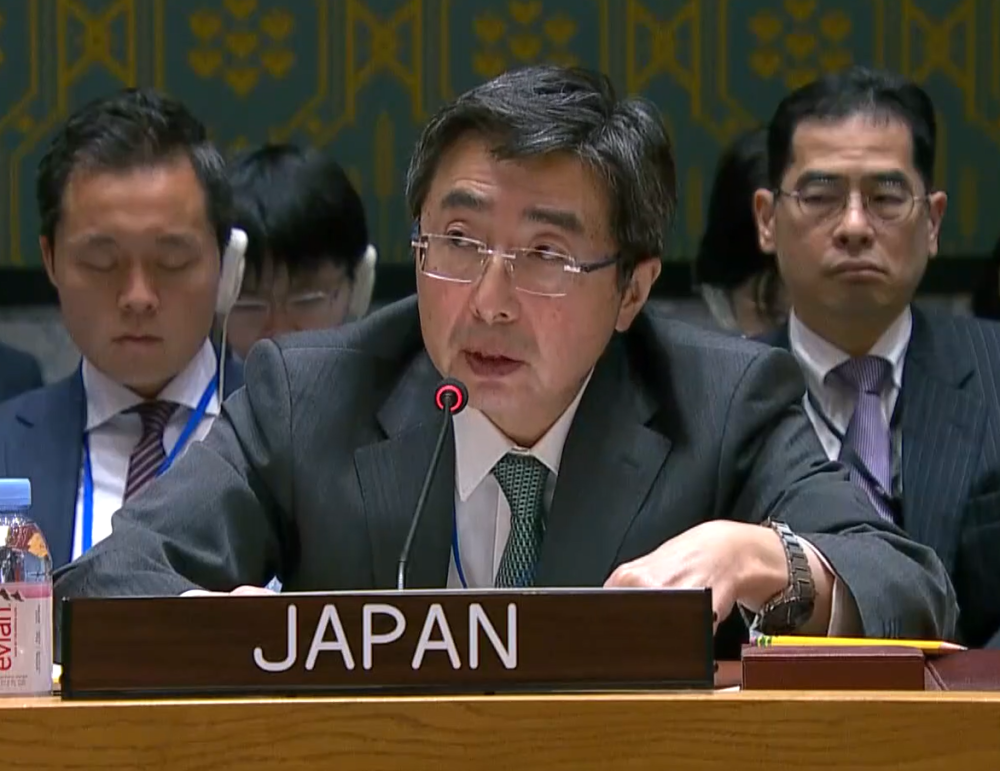Statement by H.E. Ambassador ISHIKANE Kimihiro, Permanent Representative of Japan to the United Nations, Briefing by the International Criminal Court (ICC) Prosecutor to the UN Security Council on Libya
2023/5/11

(As delivered)
Thank you, Madam President.
I thank Prosecutor Khan for his excellent and convincing briefing.
Madam President,
Let me be clear. As a matter of justice under the rule of law and reconciliation for sustainable peace, perpetrators of serious crimes must be held accountable for their wrong-doing. The International Criminal Court (ICC), as the central institution of the international criminal justice system, stands at the front line of the global fight against impunity. Japan proudly supports the Court by providing both human and financial resources, and we hereby reconfirm our unwavering commitment thereto.
We take note of the progress made in key lines of inquiry by the Court, led by the Office of the Prosecutor. In particular, the issuance of new arrest warrants will lead to the realization of justice if an appropriate process follows it without delay. Furthermore, positive collaboration with relevant national authorities has begun to bear tangible fruit in combatting crimes against migrants, which by now have become a major source of insecurity and upheaval in the region and beyond. We continue to pay close attention to this ongoing and abhorrent situation, and support efforts to hold perpetrators accountable for such atrocities.
We also recognize that the Office has made progress on the key principles for renewed action announced in April last year. It is encouraging to hear of the ongoing cooperation by Libyan authorities, as well as of the Court’s increased engagement with victims and civil society. We are convinced that strengthening cooperation with these actors will not only help the investigations, but will also contribute to gaining public support and achieving long-lasting reconciliation in the region. We take note of the ICC’s efforts towards establishing a liaison office in Tripoli in this regard.
However, it is unfortunate that we have not yet seen major progress in the investigation into the 2011 violence, including advancements in the prosecution of Saif Al-Islam Gaddafi. We look forward to seeing the Court expedite this process. The success of the Court also depends upon cooperation from States. Without their help, the Court cannot function effectively.
Colleagues, we have to recall that it is this Council that unanimously decided to refer the situation in Libya to the Court. Adopting a resolution was not a goal, but rather a starting point. Our job should not be just hearing from the Prosecutor every six months and reporting back to capitals. The Council is responsible for ensuring the full implementation of its own resolutions. We must let the Court fulfill its mandate.
Japan stands ready to further engage with relevant Member States, and we will continue to strongly support the important activities of the Court.
I thank you.
I thank Prosecutor Khan for his excellent and convincing briefing.
Madam President,
Let me be clear. As a matter of justice under the rule of law and reconciliation for sustainable peace, perpetrators of serious crimes must be held accountable for their wrong-doing. The International Criminal Court (ICC), as the central institution of the international criminal justice system, stands at the front line of the global fight against impunity. Japan proudly supports the Court by providing both human and financial resources, and we hereby reconfirm our unwavering commitment thereto.
We take note of the progress made in key lines of inquiry by the Court, led by the Office of the Prosecutor. In particular, the issuance of new arrest warrants will lead to the realization of justice if an appropriate process follows it without delay. Furthermore, positive collaboration with relevant national authorities has begun to bear tangible fruit in combatting crimes against migrants, which by now have become a major source of insecurity and upheaval in the region and beyond. We continue to pay close attention to this ongoing and abhorrent situation, and support efforts to hold perpetrators accountable for such atrocities.
We also recognize that the Office has made progress on the key principles for renewed action announced in April last year. It is encouraging to hear of the ongoing cooperation by Libyan authorities, as well as of the Court’s increased engagement with victims and civil society. We are convinced that strengthening cooperation with these actors will not only help the investigations, but will also contribute to gaining public support and achieving long-lasting reconciliation in the region. We take note of the ICC’s efforts towards establishing a liaison office in Tripoli in this regard.
However, it is unfortunate that we have not yet seen major progress in the investigation into the 2011 violence, including advancements in the prosecution of Saif Al-Islam Gaddafi. We look forward to seeing the Court expedite this process. The success of the Court also depends upon cooperation from States. Without their help, the Court cannot function effectively.
Colleagues, we have to recall that it is this Council that unanimously decided to refer the situation in Libya to the Court. Adopting a resolution was not a goal, but rather a starting point. Our job should not be just hearing from the Prosecutor every six months and reporting back to capitals. The Council is responsible for ensuring the full implementation of its own resolutions. We must let the Court fulfill its mandate.
Japan stands ready to further engage with relevant Member States, and we will continue to strongly support the important activities of the Court.
I thank you.
